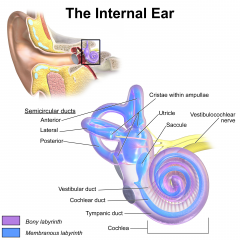Hearing in the Elderly: Difference between revisions
Wendy Walker (talk | contribs) No edit summary |
Wendy Walker (talk | contribs) No edit summary |
||
| Line 12: | Line 12: | ||
The international incidence of impaired hearing in the elderly varies among societies, but most of the world's population experiences some degree of decline in hearing with advancing age.<br> | The international incidence of impaired hearing in the elderly varies among societies, but most of the world's population experiences some degree of decline in hearing with advancing age.<br> | ||
In the USA approximately 25-30% of people aged 65-74 years are estimated to have impaired hearing. For people aged 75 years and older, this incidence is thought to rise to 40-50% | In the USA approximately 25-30% of people aged 65-74 years are estimated to have impaired hearing. For people aged 75 years and older, this incidence is thought to rise to 40-50%. | ||
A UK study<ref>Epidemiological profile of hearing impairments: the scale and nature of the problem with special reference to the elderly. | |||
Davis AC | |||
Acta Otolaryngol Suppl. 1990;476:23.</ref> found that 80% of hearing impaired people are over the age of 60. | |||
<br> | <br> | ||
== Relevant Anatomy == | |||
== Relevant Anatomy == | |||
== Conductive Hearing Loss == | == Conductive Hearing Loss == | ||
| Line 24: | Line 26: | ||
== Sensorineural Hearing Loss == | == Sensorineural Hearing Loss == | ||
== Presbycusis == | == Presbycusis == | ||
== Recent Related Research (from [http://www.ncbi.nlm.nih.gov/pubmed/ Pubmed]) == | == Recent Related Research (from [http://www.ncbi.nlm.nih.gov/pubmed/ Pubmed]) == | ||
Revision as of 23:58, 6 April 2015
Original Editor - Wendy Walker
Top Contributors - Wendy Walker, Kim Jackson, Scott Buxton, WikiSysop, Lucinda hampton, Kirenga Bamurange Liliane and Tony Lowe
Introduction[edit | edit source]
The sense of hearing is of paramount importance in spoken communication, and age-related hearing loss can lead to porblems with communication, decreased awareness of environmental clues and even social isolation.
Histologic changes associated with aging occur throughout the auditory system from the hair cells of the cochlea to the auditory cortex in the temporal lobe of the brain.
The international incidence of impaired hearing in the elderly varies among societies, but most of the world's population experiences some degree of decline in hearing with advancing age.
In the USA approximately 25-30% of people aged 65-74 years are estimated to have impaired hearing. For people aged 75 years and older, this incidence is thought to rise to 40-50%.
A UK study[1] found that 80% of hearing impaired people are over the age of 60.
Relevant Anatomy[edit | edit source]
Conductive Hearing Loss[edit | edit source]
Sensorineural Hearing Loss[edit | edit source]
Presbycusis[edit | edit source]
Recent Related Research (from Pubmed)[edit | edit source]
Extension:RSS -- Error: Not a valid URL: Feed goes here!!|charset=UTF-8|short|max=10
References[edit | edit source]
References will automatically be added here, see adding references tutorial.
- ↑ Epidemiological profile of hearing impairments: the scale and nature of the problem with special reference to the elderly. Davis AC Acta Otolaryngol Suppl. 1990;476:23.







